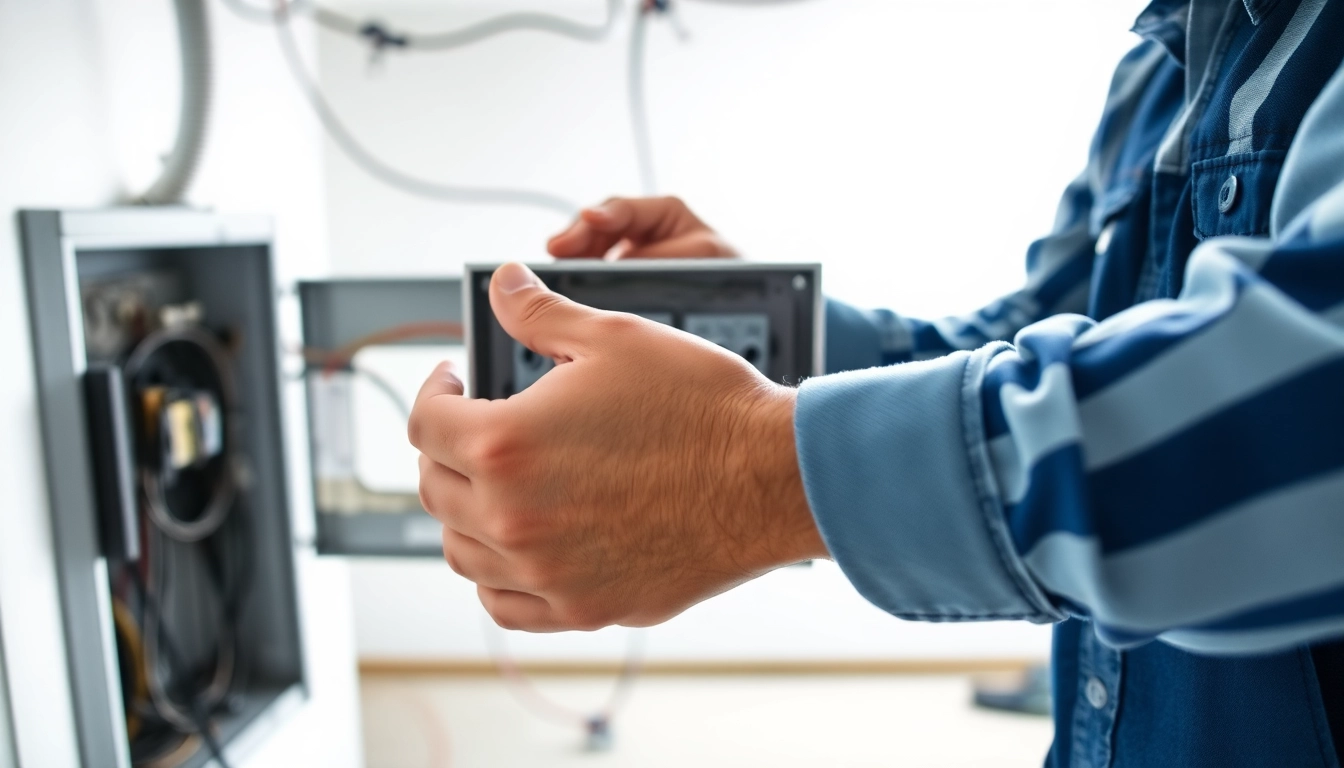What Is an Electrical Panel Upgrade?
Definition and Purpose
An Electrical Panel Upgrade involves replacing or enhancing the electrical panel in a home or business to meet modern electrical demands. This panel serves as the central hub that distributes electricity throughout a property. Over time, as technology advances and electrical appliances become more powerful, the capacity of existing panels may fall short, necessitating an upgrade. Understanding the purpose of an electrical panel upgrade is crucial for maintaining safety, efficiency, and the ability to support new technologies such as electric vehicles and high-demand appliances.
Signs Your Panel Needs an Upgrade
Identifying the right time for an upgrade is paramount. Here are some common signs indicating that it may be time to consider upgrading your electrical panel:
- Frequent Breaker Trips: If your circuit breakers frequently trip, this may signify that your current panel cannot handle the electrical load.
- Unusual Flickering Lights: Flickering or dimming lights can indicate an overloaded panel or wiring issues.
- Burning Smells: Any burning smell near the panel is a serious concern and should be addressed immediately.
- Old Panel Type: Homes with fuse boxes or older panels (like Zinsco or Federal Pacific) are at a higher risk for fire and other hazards and should be upgraded.
- Installation of New Appliances: If you plan to add new high-demand appliances, such as an electric vehicle charger or HVAC system, an upgrade may be necessary.
Common Misconceptions About Upgrades
Many homeowners have misconceptions regarding electrical panel upgrades:
- My panel is fine; it hasn’t caused any problems: Issues can develop over time, and waiting too long can be dangerous.
- Upgrading is too expensive: While there is an upfront cost, the long-term benefits, such as efficiency and safety, outweigh these initial expenses.
- Only new homes need upgrades: Residential properties, regardless of age, can benefit from upgrades to accommodate modern electrical needs.
Benefits of an Electrical Panel Upgrade
Increased Capacity for Modern Appliances
One of the primary advantages of upgrading your electrical panel is the increased capacity to accommodate modern appliances. As homes increasingly rely on technology, older panels often struggle to meet heightened demands. Typical upgrades involve boosting service from 100 amperes (amps) to 200 amps, providing sufficient power for multiple devices operating simultaneously, such as air conditioning units, home entertainment systems, and kitchen appliances. This enhanced capacity not only supports comfort but also lifestyle quality without the worry of overloading circuits.
Improved Safety and Compliance
Safety is paramount when it comes to electrical systems. An outdated panel may lack current safety features, increasing the risk of electrical fires and other hazards. Upgrading to a modern panel with enhanced circuit breakers and fuses ensures compliance with current building codes and safety standards. Moreover, safety features such as ground fault circuit interrupters (GFCIs) and arc fault circuit interrupters (AFCIs) protect against shocks and fire hazards, providing peace of mind for homeowners.
Potential for Energy Efficiency
Modern electrical panels are designed for efficiency. Upgrading can lead to reduced energy consumption as newer technology addresses load management more effectively. Enhanced energy efficiency can lower utility bills over time and may make you eligible for utility rebates or credits. Incorporating smart technology into upgraded panels allows energy monitoring, helping homeowners track usage and make informed choices about energy consumption.
Types of Electrical Panels Available
Understanding Amperage Ratings
Electrical panels come in various amperage ratings, typically ranging from 100 to 400 amps. Understanding these ratings is crucial for selecting the right panel for your needs:
- 100 Amps: Suitable for smaller homes with minimal power requirements.
- 200 Amps: Recommended for most modern homes, supporting multiple high-demand appliances.
- 400 Amps: Ideal for larger homes or those with extensive electrical systems, including electric vehicle charging stations and advanced HVAC systems.
Choosing the Right Panel for Your Home
Selecting the appropriate panel involves assessing your current and future electrical needs. Homeowners should consider factors such as:
- The square footage of the home.
- The types and number of appliances currently in use.
- Future expansions or renovations that may introduce additional demands on the electrical system.
Consulting with a licensed electrician can provide insights into the ideal amperage rating and features for a specific home, ensuring that the chosen panel meets both current and anticipated demands.
Comparing Traditional vs. Smart Electrical Panels
Homeowners now have a choice between traditional and smart electrical panels. Traditional panels offer basic functionality, while smart panels come equipped with technology that enables homeowners to monitor energy consumption from an app, receive alerts regarding power issues, and control appliances remotely. Smart panels can also communicate with solar energy systems, making them more energy-efficient options in the long run.
Cost Considerations for an Electrical Panel Upgrade
Typical Costs Involved
The cost of an Electrical Panel Upgrade can vary significantly, typically ranging from $800 to $4,000. Factors influencing cost may include:
- Type of panel being installed.
- Need for any additional wiring or circuit changes.
- Local labor rates.
- Permitting required by local zoning laws.
Estimating the total upgrade cost accurately requires a comprehensive assessment of both materials and labor, as well as consideration of any necessary electrical code compliance work.
Factors Affecting Upgrade Prices
Several elements influence the total price of an electrical panel upgrade:
- Panel Type: High-end panels, particularly smart panels, may carry higher costs.
- Access and Location: If the panel is located in a difficult-to-access area, labor costs may increase.
- House Wiring: Upgrade needs for existing house wiring can affect the overall expense.
Potential Incentives and Rebates
Many local utilities and government programs offer incentives for those upgrading their electrical panels, especially with energy efficiency improvements. Homeowners may be eligible for rebates, tax credits, or financing options that can significantly reduce upfront costs.
Researching local programs could result in substantial savings, making an upgrade a more viable financial decision. As an added advantage, these incentives often support the adoption of new technologies, enhancing not just efficiency but also sustainability.
Hiring Professionals for an Electrical Panel Upgrade
Finding Qualified Electricians
Finding a qualified electrician is vital for a successful Electrical Panel Upgrade. Homeowners should consider the following steps:
- Seek licensed and insured electricians with specific experience in panel upgrades.
- Check reviews and request recommendations from trusted sources.
- Compare estimates and ask for detailed descriptions of what services are included.
Engaging a professional ensures that the upgrade is done not only efficiently but also in compliance with all regulatory standards.
What to Expect During the Upgrade Process
The electrical panel upgrade process consists of several steps:
- Assessment: The electrician assesses the current panel and electrical system to determine the specific requirements for the upgrade.
- Preparation: This includes notifying the local utility of the upcoming changes, obtaining necessary permits, and scheduling the power shut-off.
- Installation: The new panel is installed, involving the removal of the old panel and updating wiring and connections as needed.
- Testing: Once installed, the new panel is tested for proper function and compliance with the electrical codes.
- Final Inspection: Some jurisdictions may require inspection by local code enforcement to verify that the work meets safety standards.
Post-Upgrade Maintenance and Inspection
After an upgrade, regular maintenance is essential to ensure optimal performance. Homeowners should consider routine inspections to check for wear and tear, especially if they continue to add new appliances or technologies to their home. Keeping the electrical system in top condition helps prevent future issues and prolongs the lifespan of the panel.



